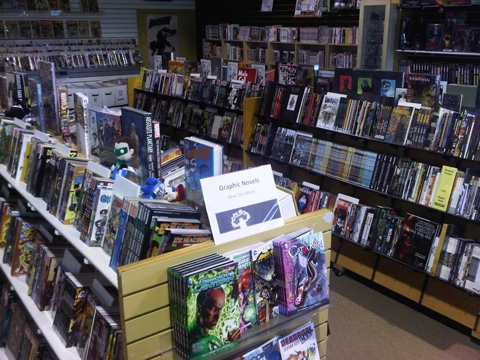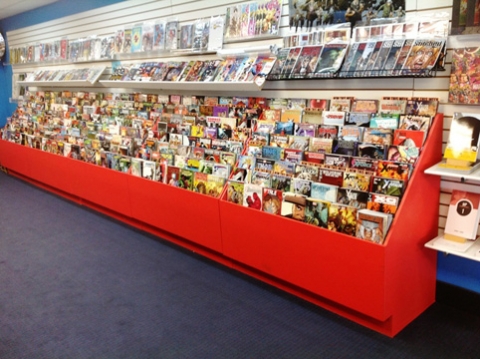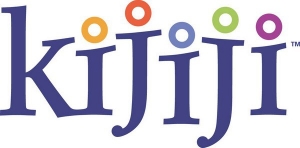In my last write up, I wrote about being more strategic with your purchases and not letting sentiment dictate your investment decisions. One of the things I discussed was understanding the value of a book. Buying a $100 book over a $1000 book isn’t necessarily cheaper. Many $100 purchases will be lost in the wind, while a $1,000 purchase can be recouped with some appreciation. Much of this depends on the book of course, but assuming you found the right book… $1,000 is still a lot of money to spend on a comic book for most people, especially if you don’t know how or where to sell a book. $1,000 isn’t the kind of money that the average person keeps in their back pocket, so without any further adieu, here is my list of where you can sell your high value possession.
There are many different kinds of collectors and various sub markets within the greater comic book market. But for the purposes of this write up, I’m focusing on “key” certified books. “Key” books because they tend to be the best investments and certified because the whole point behind third party grading is for these books to be sold and re-sold.


1. Local Comic Book Shop
Believe it or not, not all comic book shop owners are knowledgeable about investment grade comics. Many retailers are focused on new products and the things that are going to help them cover their monthly expenses. Most understand that a book like the Hulk #181 has high value but they don’t necessarily follow the market or know how to sell these types of books outside of their store. There are many knowledgeable store owners out there and if they are interested in your book, chances are you’ll have to discount your book so that they can pocket the difference as profit. Many have criticized this practice as being “underhanded” but I beg to differ. Comic stores are a business, and like any other business, they need to buy merchandise at wholesale prices so that can sell at retail.
Pros: Quick, direct and accessible.
Cons: Assuming the store is interested… you’ll have to discount your book.

2. Shows and Conventions – Dealers
The dealers at comic shows will generally be more knowledgeable but many dealers are actually shop owners as well, so you’ll run into the same issues as selling to a comic store. However, you’ll have more choice in terms of who you can sell to. You can shop your book around within a short amount of time and have a good understanding of what you can realistically achieve.
Pros: Generally a more well versed group of people. Choice of dealer can work to your advantage.
Cons: Unless the book is extremely hot, you’ll have have to discount your book.

3. Shows and Conventions – Setting Up
The other option is that you can choose to set up at a comic show yourself. This is one of the routes I’ve taken but it’s hit or miss depending on the kinds of book you have. There are also big costs involved which can easily eat up all your profits. For example, it costs almost $1000 just to set up at Fan Expo. There’s the cost of the table, parking, taxes, meals and any additional displays or shelving you decide purchase… not to mention your time. If you choose this route, you may want to try out the many smaller shows first.
Pros: Direct transactions. Expect to get close to market value for good books. Fun and enjoyable.
Cons: Costly. Learning curve. Some luck is required. Lots of competition. Need to also invest in time and energy.

4. Brokers and Consignments
There are people out there who can help you buy and sell books. However, like any agent, they take a commission and they will be more focused on making the deal as opposed to making the best deal on your behalf. Many stores are also willing to display your book. Commissions can be negotiated but generally stores tend to take a 10% cut.
Pros: You set your asking price. Drop off the book(s) and let someone else take care of it.
Cons: 10% chop. May take time so patience is required. Personally, I’ve found that trust is also an issue.


5. Kijiji and Craigslist
I have made sales on these forums but generally… NO. Buyers on these forums tend to be trolls who are looking for heavily discount books from unsuspecting sellers. You’ll get a lot of low ball offers which are not worthy of a response. Kijiji and Craigslist are good for blowing things out but this not the best place to list a premium book.
Pros: Free. Direct. Local. Deep discounts will attract the opportunists.
Cons: Chances are you won’t get top dollar here. The occasional rare sale does happen but not enough to justify these forums as being a viable venue.

6. CGC Forum
You can open a free account with CGC and start selling on their “buy and sell” forum. This is geek central… and all the hardcore comic junkies are here. However, the forum is a clique and it takes time get to know these guys… and I do mean guys. As such I’ve had mixed success here. Board members also tend to be extremely uptight and critical. These guys are up to date and are well versed on the news, trends and current prices. Unless your book is hot, they also expect a discount since no fees or commissions are involved. If GPA kept track of sales from the CGC forum, prices would actually decline since these guys expect to pay below market.
Pros: Serious buyers. Direct. Relatively quick transactions. No fees or commissions.
Cons: You need to drink their kool-aid. Only for CGC or RAW books. Buyers expect at least a 10% discount. You’ll also need to be tolerant of “flamers” as a simple statement can easily lead to a misunderstanding.



7. Online Auctions
There are many online auction venues specific to comics. I guess the biggest and the most popular ones are Heritage, ComicLink and ComicConnect. These places can be great places to buy, but depending on the book and how quickly you need to liquidate they may not be the best places to sell. With most of these venues, you have the option to simply list or auction off your book. Auctions are great for some books because speculators won’t allow these books to end cheap. However, expect at least a 10% chop in commission, add to this the cost of shipping and it will take a few weeks for a cheque to arrive. Some take PayPal fees or credit card fees directly out of your pot unless you specify or negotiate upfront. Generally, the audience here is the same group of buyers that you’ll find on the CGC boards but the advantage is that these auctions are regular, they send out an email alert to all their customers… but the biggest advantage is that they are safe. If I had a book valued at $30,000 I would prefer to use one of these venues who act as the middle man.
Pros: Your book will sell but may or may not achieve top dollar. Safe. A great place to sell high end books.
Cons: 10% (or more) commission. Similar pool of buyers as the CGC boards. May or may not achieve top dollar.

8. Ebay
We all love to hate eBay. Often affectionately referred to as “fee bay”, collectors resent all their charges and policies that favor buyers over sellers. Still, when all else fails, it is the default fall back plan for sellers because it has the biggest pool of buyers. eBay is far reaching, attracting buyers from all over the world. It is for this reason that eBay remains my top choice to sell comics. I may try other venues once in a while but eBay is so important to the collecting market, if it did not exist, I would stop buying comics altogether. As such I do my best to keep my eBay score in good standing and practice proper etiquette. Yes, there are a lots of scams on eBay, and for this reason, I would recommend that people become familiar with eBay by buying and selling low value items first. Some people find eBay forms daunting but all you really need to focus on is your description. eBay has a tiered fee structure, which is complicated and largely dependent on the value of your item and/or how your book is sold. But I like to keep things simple and factor in a 15% chop, including PayPal fees. Despite this, eBay is the only place I’m able to achieve top dollar and is important to the collecting community because eBay is the catalyst for driving prices higher. eBay is so big, that I’m always surprised why it’s not more of an integrated part of all retail stores. I think every store should have a full time employee who does nothing but list items on eBay. If you’re going start buying expensive books, make sure you have an eBay account.
Pros: Huge audience. Achieve top dollar. Pushes the value of books higher.
Cons: More prone to scams. Time consuming. Boring as heck to list. High fees.
Final thoughts
The online market tends to mimic bricks and mortar. Shopping times, marketing techniques and buying habits reflect the physical world. So, whether your book is “key” or not, focus on the selling point. Keep things visual because people don’t like to read. Auctions are not what they used to be but if you decide to risk it, don’t have it end on a Tuesday afternoon when everyone is at work. Online communication is limiting so don’t feel insulted or lose your temper. In comics as it is in life, it pays to be kind. We’re heading into the holiday season so this is actually the best time to sell.
Whether your agree or disagree with my list, I’m sure you have some buying or selling stories you’d love to share so feel free to comment.




Great post Charlie.
I wonder just how much the cumulative dealer inventory of say Silver and Bronze Age comics is shielding an even greater price drop than we are seeing for the more common stuff. I see dealers turn at least a respectable percentage of their new key pick ups (the old saying goes that you are only as good as your last collection) but the percentage of their old stock that sells at cons is minuscule yet dealers don’t want to “dump” these books to gain a sale. I wonder how much inventory is there if you add it all up and whether dealers “holding the line” on this stock is actually propping prices up a bit.
Hi Walt. I think dealers are like everyone else in this market. Many hold books while others don’t. The main difference being that dealers depend on this stuff for income. In fact, because of this, not a lot of dealers I’ve spoken to actually hold “key” books. I’ve been to warehouses where dealers have a mountain of books… but not a lot which I would consider “key”… maybe 1 or 2% of their mountain, which explains why they are always on the lookout for deals… to replenish their stock.
I do think that their is a lot of inventory out there but it’s hoarded by a specific type of collector / speculator / dealer. I myself am hording several ASM#129’s, Hulk#181’s… etc. hoping to release them into the market at the right time… but only because I’ve got tons of other material that I’m working on which I believe are more time sensitive. I’m not sure what you’re eluding to… so apologies if my response seems vague.
You touched on it Charlie.
Those mountains that most dealers have and lug around from show to show represent a sizable chunk of half decent, but not key, stuff. Books like say ASM #24, FF #42, Cap #101, Showcase #36, Detective #320 etc. The point of liquidity of these books is getting lower and lower and no dealer I know is willing to let them go for what may be the current natural price so they just wait it out, sometimes for years until a buyer comes along.
I was just wondering out loud if the sheer volume of these types of books bogged down in dealer inventories actually helps prop their prices up artificially in any way due to them not actually trading. You helped me answer my own question in that the answer is no, it does not shore up the prices, the sell point of these types of books keeps eroding.
Perhaps where I’m going with this train of thought is to question whether this old classic dealer model is even sustainable anymore. I remember the days of guys lining up at my bins with lists knocking off those holes in their Daredevil or Green Lantern runs. Now they scan the wall for Batman Adventure #12 and Hulk #181.
I brought it up because I think it is a trend that a seller of books that would be defined as dealer inventory should be aware of. Basically sellers of books like these would have received more for them 15 years ago.
Honestly, I don’t know how some dealers manage. At least you’ve got a store and a mix of products you can sell. Dealers who depend on the show circuit and sell back issues exclusively is a big mystery to me. I know that they also have clients but I just can’t imagine that they would have enough clients constantly buying books off of them at a healthy margin to make it all work. I hate to say it but many of these dealers are living in the past. They can complain all they want about the current state of affairs but it’s their inability or unwillingness to change that’s hurting them the most.
There’s just not enough people who can appreciate books like Cap #101. These days a book needs to have a “selling point”. Some thing that makes it special… which is what a first appearance is all about. Outside of this, maybe a costume change, a signature, an error, high grade, cameo… or even a 1st issue. Personally, I think dealers who have a warehouse full of books are better off building runs, tossing a couple of keys into the mix and listing on eBay. The selling point here is that the run is (near) complete and buyers save big by picking up a collection in one shot. I even sold my 90’s run this way. Many dealers in the US still buy collections because they have old thinking… so why not piece out that mountain of books and let them deal with it. Put that money from the sale into something that will grow, shut down the warehouse and stop paying rent (you know who I’m talking about). I really love older books and I wish I could afford to keep them all but at my age, I’ve got other priorities.
Bobby Fischer was a champion chess player because he could see 10 steps ahead. Not all of us are as gifted but idea is to look forwards and not backwards.
so… lack of liquidity, oversupply, and few avenues to sell your books. for top dollar..
sounds like a great investment to me.
Comics are like any other investment. You have to pick and choose the right book(s). The point of my write is to be strategic and not let emotion dictate you’re purchases. It’s easy to see a trend and jump on it. People do it all the time with stocks. Consider how many people own Apple shares these days. You may think you’re smart for having made some gains… on paper. But, the the other half of the equation is knowing when to get off. Comics for me have been so much better than letting the money just sit in the bank.
“many people own Apple shares these days. You may think you’re smart for having made some gains… on paper. ”
the difference with apple (or any other liquid share) , is that someone can buy and sell a few hundred million dollars worth of the stuff in a few minutes without affecting the price.
it seems one needs to take weeks, months? to sell a comic book anywhere near “full value” even if it’s a “strategic” book. and if you needed to sell all your comics tomorrow, for whatever reason, you would likely not get half of what they are worth
Again Nestor, it depends on the book. Books like Hulk #181 consistently achieve market or close to market if you simply auction it off. Have you ever tried to sell penny stocks or held shares of Nortel, JDS Uniphase, Yahoo… Taser? To state the obvious… no speculative investment is free from risk.
Let me be clear. I’m not promoting comics or stocks as a good investment. That’s for you to decide… and liquidity is a topic in itself. In my opinion, the best use of your time is plain and simple hard work. Slow and steady wins the race. However, this is a comic book forum so my point is simply if you’re going to play game… play to win. Don’t lose money by making decisions based on emotion.
Hulk #181 has more than double in recent years while all 5 major banks paid out virtually nothing to their customers who let their money sit in their accounts. Like Apple, if you jumped in early, you will have done well. If you bought Cap #101 instead… chance are that your money would have been better off if you let it sit in the bank.
http://www.eltoro505.com/_comics/hulk181.png
yes, it’s all risky business—i have been in this game almost 60 years. My Broker friend over 40. He lives and breaths this world. Apple buying up it’s own shares —then his mind works overtime balancing risk reward as he explains it all to me.—and it flies past me like a 110 mph fastball! Too many people over estimate their abilities Go and stick with what you understand . There'”s no easy way. By the way, my Wall Sreet friend has’nt a clue about the comic book investment world.
” Hulk #181 has more than double in recent years while all 5 major banks paid out virtually nothing to their customers who let their money sit in their accounts. ”
you are comparing a risk free deposit at a Canadian bank to a speculative investment like the hulk 181. that’s hardly a valid comparison. deposits are cash, not investments.
why don’t you compare your hulk 181 to actual RY share and see how that stacks up?
“My Broker friend over 40. ”
no offense, and i mean this as a generalization, but most brokers are just sales people. anyone advising you to purchase individual shares should have their license taken away.
The general rule when it comes to investing is higher the risk, greater the rewards. At the same time, you can’t expect something by doing nothing. It all comes down to what you can stomach.
Nestor, I’m not sure what you’re pushing here…. If you don’t believe in comics as an investment, then don’t invest. Stick to stocks or let your money sit in your account. What ever turns you on. I never once suggested that any of this is wrong or right. Go live your life… be happy with what ever you decide to do.
My write up is for those who are interested in buying and selling comics. I’ll be set up at the Toronto Comic Show this Sunday if anyone wants to discuss the subject in person. Should be a good show… come say hello.
http://www.torontocomicbookshow.com/
Great insights Charlie. I see that Social media has not been mentioned yet as a selling venue. I’ve been on a few Facebook groups for local comic buyers but these Facebook groups have not really caught on in my area. However, this could have potential as the social networks and technology develops. I noticed a Facebook Walking Dead collectors group that seems quite active and which has endured: https://www.facebook.com/groups/1588601241419151/ (You need to be logged into Facebook to see this Facebook page).
Right on Peter! So with so many avenues to sell your investment book, there should be less trepidation seeking out quality over junk just because it’s cheaper.
The venues mentioned here are also great places to buy and seek out information… like how much Spawn#1 is really worth. As I mentioned in my previous write up, I’d rather overpay on a book like Hulk#181 than underpay on a book like Cap#360.
Great points Charlie! There are so many ways to approach comic speculation but an important distinction is whether you’re doing it for fun or trying to make a living from it. Regarding key issues; I have been buying and selling quite often and I agree that non-key back issues are in the decline while key issues are on the rise! The other key factor is condition. High grade books are doing very well, especially silver and Bronze Age books, even if they aren’t key issues. Many of us love high grade books and are willing to pay more for them.
I started collecting in 1969, and long ago completed my Marvel collection (1958-1986) But now, I’m upgrading and I reley on dealers to have a deep stock of common issues at bigger shows. Those books are gone from a lot of brick and morter stores, but still available on line amd shows. My DC collection is also missing a lot of non-key issues, that I’m very happy to pay full guide for. I love this website and this article. You are very knowledgable.
Guys,
Any current experiences with CGC boards? I’ve never used them to sell but have been scanning them recently and they seem like a good balance between zero transaction costs and fair (considering no transaction costs) prices. Is it safe? (eg – ratio of honest payers to scammers?) Say, compared to Facebook forums? I would assume this is a clean, sincere community at CGC boards but I could be wrong.
Do you need an intro post? Any tips appreciated, Thanks!
4.5